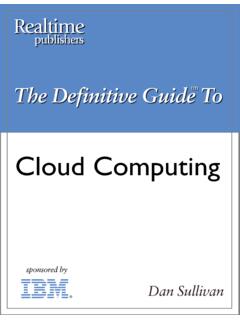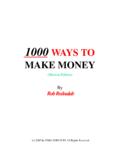Transcription of The Philosophy of Money - Eddie
1 The Philosophy of MoneyIn The Philosophy of Money , Georg Simmel presents a remarkable andwide-ranging discussion of the social, psychological and philosophicalaspects of the Money economy. He provides us with a detailed analysis ofthe circulation and exchange of commodities, while considering therelationship of Money to the human personality, the position of women,individual freedom and other key areas of human existence. Through thishe creates a series of brilliant insights into the forms which socialrelationships take and gives us a comprehensive analysis of theinterrelationships between the most diverse and seemingly unconnectedsocial and cultural pioneering work by Georg Simmel has increasingly been recognizedas an important and influential economic and sociological text.
2 This editioncontains a substantial new preface by David Frisby, in which hereconsiders Simmel s ideas and theories in the light of historical andcontemporary Simmel (1858 1918) taught sociology and Philosophy at theUniversity of Berlin for the greater part of his life. In 1914 he wasappointed to a chair at Strasbourg University, where he remained until late Tom Bottomore was Emeritus Professor of Sociology at Frisby is Professor of Sociology at Glasgow University.
3 The Philosophy of MoneyThird enlarged editionGeorg SimmelEdited byDavid FrisbyTranslated byTom Bottomore and David Frisbyfrom a first draft by Kaethe MengelbergLONDON AND NEW YORKF irst published in l978by Routledge and Kegan Paul LtdSecond edition published in 1990by Routledge11 New Fetter Lane, London EC4P 4 EEThird edition published in 2004by Routledge11 New Fetter Lane, London EC4P 4 EESimultaneously published in the USA and Canadaby Routledge29 West 35th Street, New York, NY 10001 Routledge is an imprint of the Taylor & Francis GroupThis edition published in the Taylor & Francis e-Library, 2005.
4 To purchase your own copy of this or any of Taylor & Francis or Routledge scollection of thousands of eBooks please go to 1978, 1990, 2004 RoutledgeAll rights reserved. No part of this book may be reprinted or reproduced orutilized in any form or by any electronic, mechanical, or other means, nowknown or hereafter invented, including photocopying and recording, or inany information storage or retrieval system, without permission in writingfrom the Library Cataloguing in Publication DataA catalogue record for this book is available from the British LibraryLibrary of Congress Cataloging in Publication DataA catalog record for this book has been requestedISBN 0-203-48113-5 Master e-book ISBNISBN 0-203-68069-3 (Adobe eReader Format)ISBN 0-415-34173-6 (hbk)ISBN 0-415-34172-8 (pbk)
5 Contents Acknowledgements xii Note on the Translation xiii Preface to the Third Edition xiv Preface to the Second Edition xlvi Introduction to the Translation 1 THE Philosophy OF Money Preface 51 ANALYTICAL PART Chapter 1 Value and Money 56 I 56 Reality and value as mutually independent categoriesthrough which our conceptions become images of theworld 56 The psychological fact of objective value 59 Objectivity in practice as standardization or as aguarantee for the totality of subjective values 61 Economic value as the objectification of subjectivevalues, as a result of establishing distance between theconsuming subject and the object 62 An analogy with aesthetic value 70 Economic activity establishes distances and overcomesthem 72 II 76 Exchange as a means of overcoming the purely subjectivevalue significance of an object 76 In exchange.
6 Objects express their value reciprocally 77 The value of an object becomes objectified byexchanging it for another object 79 Exchange as a form of life and as the condition ofeconomic value, as a primary economic fact 79 Analysis of the theories of utility and scarcity 88 Value and price: the socially fixed price as a preliminarystage of the objectively regulated price 92 III 99 Incorporation of economic value and a relativistic worldview 99 The epistemology of a relativistic world view 100 The construction of proofs in infinite series and theirreciprocal legitimation 102 The objectivity of truth as well as of value viewed as arelation between subjective elements 106 Money as the autonomous manifestation of the exchangerelation which transforms desired objects into
7 Economicobjects, and establishes the substitutability of objects 117 Analysis of the nature of Money with reference to itsvalue stability, its development and its objectivity 120 Money as a reification of the general form of existenceaccording to which things derive their significance fromtheir relationship to each other 127 Chapter 2 The Value of Money as a Substance 129 I 129 The intrinsic value of Money and the measurement ofvalue 129 Problems of measurement 131 The quantity of effective Money 135 Does Money possess an intrinsic value?
8 140 The development of the purely symbolic character ofmoney 144v II 150 Renunciation of the non-monetary uses of monetarymaterial 150 The first argument against Money as merely a symbol:the relations of Money and goods, which would make anintrinsic value for Money superfluous, are not accuratelydeterminable; intrinsic value remedies this deficiency 154 The second argument against Money as merely a symbol:the unlimited augmentability of monetary symbols;relativistic indifference to the absolute limits of monetaryquantity and the errors to which this indifference leads 158 The supply of Money 160 The reciprocal nature of the limitation that reality placeson pure concepts 163 III 167 The historical development of Money from substance tofunction 167 Social interactions and their crystallization into separatestructures.
9 The common relations of buyer and seller tothe social unit as the sociological premise of monetaryintercourse 169 Monetary policy: largeness and smallness, diffusenessand concentration of the economic circle in theirsignificance for the intrinsic character of Money 171 Social interaction and exchange relations: Money sfunctions: its facilitation of trade, its constancy as ameasure of value, its mobilization and condensation ofvalues 173 The nature of the economic circle and its significance formoney 179 The transition to Money s general functional character 183 The declining significance of Money as substance 190 The increasing significance of Money as value 198 Chapter 3 Money in the Sequence of Purposes 204 I 204vi Action towards an end as the conscious interactionbetween subject and object 204 The varying length of teleological series 207 The tool as intensified means 209 Money
10 As the purest example of the tool 210 The unlimited possibilities for the utilization of Money 212 The unearned increment of wealth 217 The difference between the same amount of Money aspart of a large and of a small fortune 219 Money because of its character as pure means aspeculiarly congruent with personality types that are notclosely united with social groups 221 II 228 The psychological growth of means into ends 228 Money as the most extreme example of a meansbecoming an end 232 Money as an end depends upon the cultural tendenciesof an epoch 233 Psychological consequences of Money s teleologicalposition 235 Greed and avarice 239 Extravagance 248 Ascetic poverty 252 Cynicism 256 The blas attitude 257 III 259 The quantity of Money as







